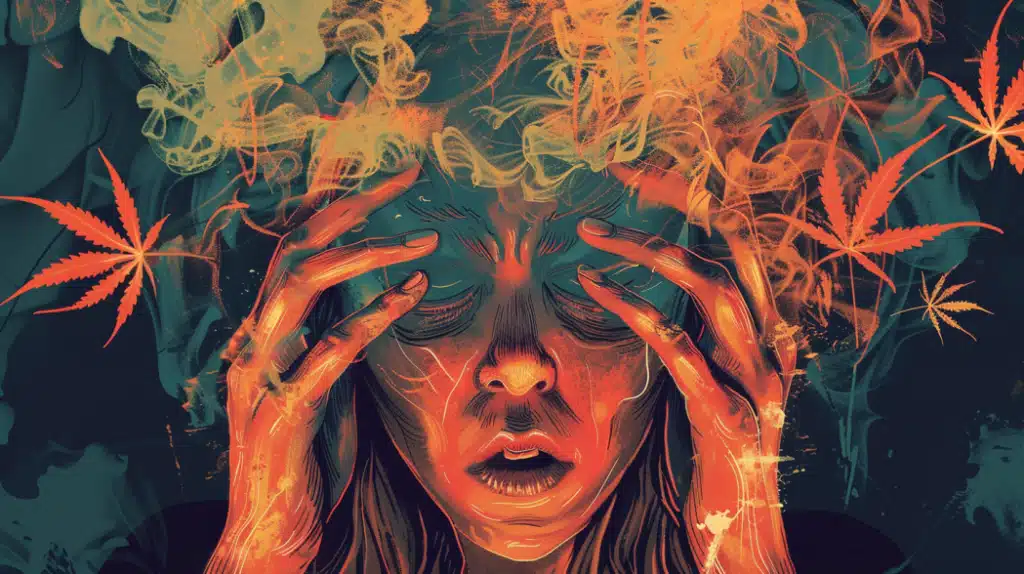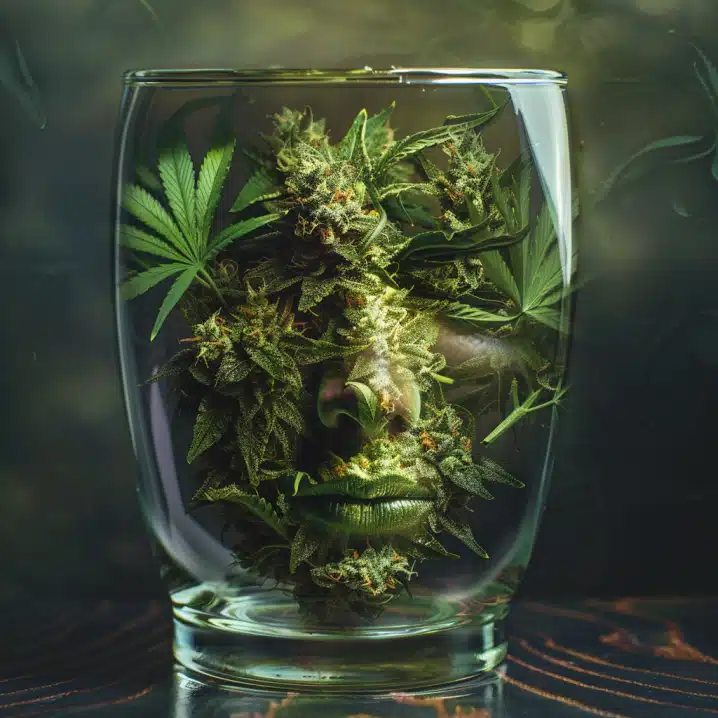The relationship between cannabis use (CU) and anxiety disorders (AD) is a topic of ongoing debate and research within the scientific community.
While some studies suggest cannabis can have anxiolytic (anxiety-reducing) effects, others point to anxiogenic (anxiety-inducing) outcomes, especially with habitual use.
This nuanced interplay between cannabis and anxiety highlights the importance of understanding individual differences, dosing, and the underlying mechanisms at play.
Highlights:
- Evidence is Mixed: Research shows both anxiolytic and anxiogenic effects of cannabis, with a stronger association between cannabis use disorder (CUD) and anxiety disorders.
- Self-Medication Hypothesis Prevails: Many individuals use cannabis as a form of self-medication for pre-existing anxiety, rather than cannabis use leading to anxiety disorders.
- Causal Relationship Unclear: Despite longitudinal studies suggesting a link between CU and AD, a direct causal relationship remains hard to establish due to confounding factors.
- CBD Shows Promise: Cannabidiol (CBD), a compound in cannabis, is being researched for its potential to reduce anxiety without the psychoactive effects associated with tetrahydrocannabinol (THC).
Source: Medical Cannabis & Cannabinoids (2024)
Can Cannabis Worsen Anxiety?
The relationship between cannabis use and anxiety is complex, with evidence suggesting that cannabis can both alleviate and exacerbate anxiety symptoms.
The impact of cannabis on an individual’s anxiety levels can vary significantly based on several factors, including the type of cannabinoids consumed, dosage, individual physiology, and the context of use.
THC & Anxiety: A Double-Edged Sword
Tetrahydrocannabinol (THC) is the primary psychoactive component of cannabis, responsible for the “high” associated with its use.
While low doses of THC can produce calming effects and reduce anxiety in some individuals, higher doses may lead to increased anxiety, paranoia, and panic attacks.
This dose-dependent response is due to THC’s ability to activate the brain’s endocannabinoid system, which plays a critical role in regulating mood and stress responses.
At high concentrations, THC can overstimulate the amygdala, a brain region involved in fear and anxiety, leading to heightened anxiety levels.
CBD & Its Anxiolytic Potential
In contrast to THC, CBD (cannabidiol) is a non-psychoactive cannabinoid that has shown promise in reducing anxiety without the intoxicating effects.
CBD interacts with the endocannabinoid system differently than THC, potentially inducing anxiolytic (anxiety-reducing) effects by modulating serotonin receptors, which are key in anxiety regulation.
Research indicates that CBD can decrease anxiety in both clinical and preclinical studies, suggesting its potential as a treatment for various anxiety disorders, including generalized anxiety disorder (GAD), social anxiety disorder (SAD), and post-traumatic stress disorder (PTSD).
Combining Cannabinoids (CBD & THC)
The “entourage effect” refers to the synergistic interaction between THC, CBD, and other cannabinoids, as well as terpenes found in cannabis.
This interaction can modulate the overall effects of cannabis on anxiety. For instance, CBD is thought to counteract some of the anxiety-inducing effects of THC.
Therefore, cannabis strains with a balanced or higher ratio of CBD to THC may be less likely to exacerbate anxiety and more effective for anxiety relief.
Major Findings: Cannabis Use vs. Anxiety Disorders (2024 Review)
Beletsky et al. conducted a review to evaluate the relationship between cannabis use (CU), cannabis use disorder (CUD), anxiety disorders (AD), and state anxiety.
This analysis drew upon a wide array of research methodologies, including case reports, observational studies, and both clinical and preclinical trials, to offer a nuanced understanding of the complex interplay between cannabis and anxiety.
1. Link Between Cannabis Use & Anxiety Disorders
Mixed Evidence: The review highlights the mixed nature of evidence regarding the relationship between CU/CUD and AD or state anxiety. While some case-control and cohort studies found no significant correlation, a substantial number of cross-sectional and longitudinal studies reported significant associations.
Meta-Analysis Findings: A meta-analysis cited within the review indicates a statistically significant association between anxiety and CU/CUD, with odds ratios (OR) suggesting a moderate but significant correlation. Specifically, CU was associated with a 24% increased odds of anxiety (OR = 1.24), and CUD showed a 68% increased odds (OR = 1.68).
2. Exploration of Causal Pathways
Self-Medication Hypothesis: The review strongly supports the self-medication hypothesis, which posits that individuals with pre-existing anxiety may use cannabis as a means to alleviate their symptoms. This hypothesis is backed by several studies indicating that anxiety often precedes CU/CUD, suggesting that anxiety may predispose individuals toward using cannabis.
Causality & Common Factor Theory: The paper discusses the complexity of establishing a causal relationship between CU/CUD and AD, with the common factor theory (suggesting that overlapping predisposing factors may explain the association) and causality (the idea that CU/CUD may lead to AD) receiving less support due to the lack of substantial evidence and the challenges of ruling out confounding variables.
3. Critical Analysis of Research Limitations
Inconsistent Findings: The review notes the inconsistency of findings across studies, which could be attributed to differences in study design, sample populations, and measurement of cannabis use and anxiety.
Confounding Factors: Many studies do not adequately control for confounding factors, such as genetic predisposition, environmental stressors, and use of other substances, which could influence the observed relationship between cannabis use and anxiety.
4. Implications for Future Research
The paper calls for more longitudinal and epidemiological studies to better understand the temporal relationship between CU/CUD and anxiety, suggesting that such research could clarify whether CU is a true risk factor for the development of AD.
It also highlights the need for research into the therapeutic potential of cannabinoids, particularly CBD, for anxiety disorders, given its potential to reduce anxiety without the psychoactive effects associated with THC.
5. Conclusions Drawn
The review concludes that the association between cannabis and anxiety is most consistently explained by the self-medication hypothesis, with individuals using cannabis to alleviate pre-existing anxiety symptoms.
It suggests that a direct causal relationship in which CU/CUD leads to AD is less likely, emphasizing the need for future research to further elucidate this complex relationship.
How Cannabis Could Increase Risk of Anxiety Disorders (Possible Mechanisms)
Understanding how cannabis might causally increase the risk for anxiety disorders requires an exploration of the biological, psychological, and social mechanisms that could underlie such a relationship.
Biological Mechanisms
- Endocannabinoid System Dysregulation: Cannabis use directly interacts with the endocannabinoid system (ECS), which plays a crucial role in regulating mood, stress responses, and emotional homeostasis. Chronic cannabis use can lead to dysregulation of the ECS, potentially resulting in an impaired stress response and heightened anxiety.
- Neurotransmitter Alterations: THC, the psychoactive component of cannabis, affects neurotransmitter systems, including GABA and glutamate, which are critical for anxiety regulation. THC can disrupt the balance between these neurotransmitters, leading to increased anxiety levels.
- Neural Circuitry Changes: Cannabis use has been shown to affect brain areas involved in anxiety, such as the amygdala, prefrontal cortex, and hippocampus. Alterations in the connectivity and function of these regions can exacerbate or contribute to the development of anxiety disorders.
Psychological Mechanisms
- Cognitive Impairment: Cannabis use, especially at a young age, can impair cognitive functions, including attention, memory, and decision-making. These impairments can increase stress and anxiety by affecting an individual’s ability to cope with everyday challenges and stressors.
- Mental Health Comorbidity: Individuals with pre-existing mental health conditions, such as depression, are more likely to use cannabis as a form of self-medication. This comorbidity can exacerbate underlying conditions, leading to a cyclical pattern where cannabis use and anxiety fuel each other.
Social Mechanisms
- Life Stressors & Social Dynamics: The social context of cannabis use, including legal issues, stigma, and interpersonal relationships, can contribute to stress and anxiety. Users may experience increased anxiety related to the fear of legal repercussions, social judgment, or the impact of their use on personal relationships.
- Withdrawal & Dependence: Chronic cannabis use can lead to physical dependence, with withdrawal symptoms including anxiety, irritability, and restlessness. These symptoms can create a feedback loop, where users consume more cannabis to alleviate withdrawal-induced anxiety, further increasing their risk for anxiety disorders.
Genetic & Environmental Interactions
- Genetic Predisposition: Individual genetic differences can influence how one’s body and brain respond to cannabis, with certain genetic profiles potentially increasing the risk of developing anxiety disorders in response to cannabis use.
- Environmental Stressors: The interaction between cannabis use and environmental factors, such as trauma or chronic stress, can exacerbate the risk of anxiety disorders. Cannabis may alter an individual’s stress response, making them more susceptible to the negative effects of environmental stressors.
Why Cannabis Use Might Only Correlate with Anxiety Disorders…
Exploring the link between cannabis use and the increased risk of anxiety disorders reveals a nuanced landscape where correlation does not necessarily imply causation.
Several factors contribute to the observed association, emphasizing the complexity of disentangling these relationships.
Confounding Factors
- Pre-existing Mental Health Conditions: Individuals with anxiety disorders may be more inclined to use cannabis as a form of self-medication, suggesting that the observed association between cannabis use and anxiety could be due to underlying mental health issues rather than a direct effect of cannabis.
- Genetic Predisposition: Genetic factors that predispose individuals to anxiety disorders may also increase the likelihood of cannabis use, creating a spurious correlation where the relationship between cannabis use and anxiety disorders is mediated by shared genetic vulnerabilities.
Bidirectional Influence
- Self-Medication Hypothesis: The self-medication hypothesis posits that individuals may use cannabis to alleviate symptoms of anxiety and stress, indicating a bidirectional relationship. This complicates the interpretation of causality, as it suggests that anxiety could lead to increased cannabis use, rather than the other way around.
Socioeconomic & Environmental Factors
- Socioeconomic Status (SES): Lower SES is associated with both higher rates of cannabis use and increased risk of anxiety disorders, suggesting that socioeconomic factors could confound the relationship between cannabis use and anxiety.
- Exposure to Stress: Individuals experiencing high levels of environmental stress may use cannabis as a coping mechanism, while also being at a higher risk for anxiety disorders due to the stress itself.
Variability in Cannabis Use Patterns
- Dose & Frequency: The effects of cannabis on anxiety may vary significantly based on the dosage, frequency of use, and the specific cannabinoid profile of the cannabis consumed. This variability can contribute to the correlation without necessarily indicating a direct causal link.
- Age of Initiation: The age at which individuals begin using cannabis can influence the risk of developing anxiety disorders, with early use associated with greater risk. However, this association may reflect underlying issues that lead to both early cannabis use and increased anxiety, rather than direct causation.
Research Challenges
- Retrospective Studies: Many studies rely on self-reported data and retrospective reporting of cannabis use and anxiety symptoms, which can introduce recall bias and affect the accuracy of the observed associations.
- Lack of Standardization: Differences in how studies measure cannabis use (e.g., frequency, quantity, method of consumption) and anxiety (e.g., clinical diagnosis, self-reported symptoms) can lead to inconsistent findings and complicate the interpretation of the relationship between cannabis and anxiety.
Conclusion: Cannabis Use & Anxiety Disorders
References
- Paper: Cannabis and Anxiety: A Critical Review (2024)
- Authors: Alexander Beletsky et al.


